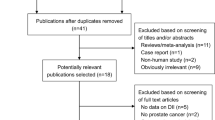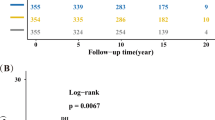Abstract
Background
Dietary factors may play a role in bladder cancer etiology through modulation of inflammation. The purpose of this study was to examine the relationship between the inflammatory potential of diet, as estimated by the Dietary Inflammatory Index (DII®), and bladder cancer risk.
Methods
Energy-adjusted DII (E-DIITM) scores were computed among 101,721 participants in the Prostate, Lung, Colorectal, and Ovarian (PLCO) study. Hazard ratios (HRs) and 95% confidence intervals (CIs) were estimated using Cox regression analysis stratified by sex, with adjustment for smoking status and other confounding.
Results
Over a median of 12.5 years of follow-up, 776 bladder cancer cases were diagnosed. E-DII scores were not associated with bladder cancer risk in the multivariable models. The HRs (95% CIs) in the highest compared with the lowest E-DII quintile were 0.90 (0.70–1.17) and 1.22 (0.72–2.06) for men and women, respectively. The associations did not differ when DII score was set as a continuous variable. The HRs (95% CIs) of one-unit increment in the E-DII for bladder cancer risk were 0.99 (0.96–1.02) and 1.01 (0.94–1.10) for men and women, respectively.
Conclusions
Our study does not support an association between inflammatory potential of diet, as estimated by the E-DII, and bladder cancer risk.
This is a preview of subscription content, access via your institution
Access options
Subscribe to this journal
Receive 12 print issues and online access
$259.00 per year
only $21.58 per issue
Buy this article
- Purchase on Springer Link
- Instant access to full article PDF
Prices may be subject to local taxes which are calculated during checkout


Similar content being viewed by others
References
Hunter P. The inflammation theory of disease. The growing realization that chronic inflammation is crucial in many diseases opens new avenues for treatment. EMBO Rep. 2012;13:968–70.
Ricordi C, Garcia-Contreras M, Farnetti S. Diet and inflammation: possible effects on immunity, chronic diseases, and life span. J Am Coll Nutr. 2015;34:10–3.
Kiecolt-Glaser JK. Stress, food, and inflammation: psychoneuroimmunology and nutrition at the cutting edge. Psychosom Med. 2010;72:365–9.
Jacobs DR, Jr., Gross MD, Tapsell LC. Food synergy: an operational concept for understanding nutrition. Am J Clin Nutr. 2009;89:1543S–8S.
Shivappa N, Steck SE, Hurley TG, Hussey JR, Hebert JR. Designing and developing a literature-derived, population-based dietary inflammatory index. Public Health Nutr. 2014;17:1689–96.
Garcia-Arellano A, Martinez-Gonzalez MA, Ramallal R, Salas-Salvado J, Hebert JR, Corella D, et al. Dietary inflammatory index and all-cause mortality in large cohorts: the SUN and PREDIMED studies. Clin Nutr. 2018;38:1221–31.
Namazi N, Larijani B, Azadbakht L. Association between the dietary inflammatory index and the incidence of cancer: a systematic review and meta-analysis of prospective studies. Public Health. 2018;164:148–56.
Shivappa N, Hebert JR, Mirsafa F, Rashidkhani B. Increased inflammatory potential of diet is associated with increased risk of bladder cancer in an Iranian case-control study. Nutr Cancer. 2019;71:1086–93.
Shivappa N, Hebert JR, Rosato V, Rossi M, Libra M, Montella M, et al. Dietary inflammatory index and risk of bladder cancer in a large italian case-control study. Urology. 2017;100:84–9.
Dugue PA, Hodge AM, Brinkman MT, Bassett JK, Shivappa N, Hebert JR, et al. Association between selected dietary scores and the risk of urothelial cell carcinoma: a prospective cohort study. Int J Cancer. 2016;139:1251–60.
Prorok PC, Andriole GL, Bresalier RS, Buys SS, Chia D, Crawford ED, et al. Design of the prostate, lung, colorectal and ovarian (PLCO) cancer screening trial. Control Clin Trials. 2000;21:273S–309S.
Subar AF, Thompson FE, Kipnis V, Midthune D, Hurwitz P, McNutt S, et al. Comparative validation of the Block, Willett, and National Cancer Institute food frequency questionnaires: the Eating at America’s Table Study. Am J Epidemiol. 2001;154:1089–99.
National Cancer Institute. Diet history questionnaire. Risk factor monitoring and methods. Version current. 2016. http://www.riskfactor.cancer.gov/DHQ. Accessed 30 Nov 2016.
Cancer Data Access System. DQX dataset: data dictionary, appendix 2: nutrient. Washington (DC): US Department of Health and Human Services; 2013.
Marrie RA, Dawson NV, Garland A. Quantile regression and restricted cubic splines are useful for exploring relationships between continuous variables. J Clin Epidemiol. 2009;62:511–7 e1.
Shivappa N, Godos J, Hebert JR, Wirth MD, Piuri G, Speciani AF, et al. Dietary inflammatory index and cardiovascular risk and mortality-a meta-analysis. Nutrients. 2018;10:E200.
Garcia-Arellano A, Martinez-Gonzalez MA, Ramallal R, Salas-Salvado J, Hebert JR, Corella D, et al. Dietary inflammatory index and all-cause mortality in large cohorts: the SUN and PREDIMED studies. Clin Nutr. 2019;38:1221–31.
Fowler ME, Akinyemiju TF. Meta-analysis of the association between dietary inflammatory index (DII) and cancer outcomes. Int J Cancer. 2017;141:2215–27.
Melamed A, Robinson JN. Case-control studies can be useful but have many limitations: study design: case-control studies. BJOG. 2019;126:23.
Abufaraj M, Tabung FK, Shariat SF, Moschini M, Devore E, Papantoniou K, et al. Association between inflammatory potential of diet and bladder cancer risk: results of three United States prospective cohort studies. J Urol. 2019;202:484–9.
Zenser TV, Lakshmi VM, Davis BB. N-glucuronidation of benzidine and its metabolites. Role in bladder cancer. Drug Metab Dispos. 1998;26:856–9.
Acknowledgements
The authors thank the National Cancer Institute for access to NCI’s data collected by the Prostate, Lung, Colorectal, and Ovarian (PLCO) Cancer Screening Trial. The statements contained herein are solely those of the authors and do not represent or imply concurrence or endorsement by NCI.
Author information
Authors and Affiliations
Contributions
All the authors contributed to the work and approved the final version of the manuscript. Particularly, contributions were: study design: JL and XX; Data collection: XX; Data analyses and interpretation: XX, NS, JH; Manuscript drafting: JL and XX; Critical revision of the manuscript: XX, NS, JH.
Corresponding author
Ethics declarations
Conflict of interest
JRH owns controlling interest in Connecting Health Innovations LLC (CHI), a company that has licensed the right to his invention of the Dietary Inflammatory Index (DII®) from the University of South Carolina in order to develop computer and smart phone applications for patient counseling and dietary intervention in clinical settings. NS is an employee of CHI. This study received no external sponsorship from industry. In addition, the subject matter of this paper will not have any direct bearing on the work of CHI, nor has any CHI activity exerted any influence on this project. The authors declare that they have no conflict of interest.
Additional information
Publisher’s note Springer Nature remains neutral with regard to jurisdictional claims in published maps and institutional affiliations.
Rights and permissions
About this article
Cite this article
Luo, J., Shivappa, N., Hébert, J.R. et al. Dietary inflammatory index and bladder cancer risk: a prospective study. Eur J Clin Nutr 74, 1428–1433 (2020). https://doi.org/10.1038/s41430-020-0602-y
Received:
Revised:
Accepted:
Published:
Issue Date:
DOI: https://doi.org/10.1038/s41430-020-0602-y
This article is cited by
-
Dietary inflammatory index and prostate cancer risk: MCC-Spain study
Prostate Cancer and Prostatic Diseases (2022)



